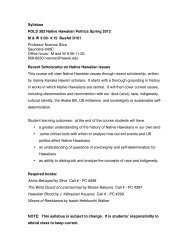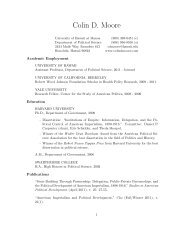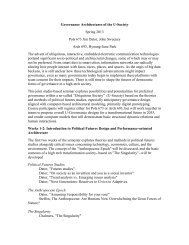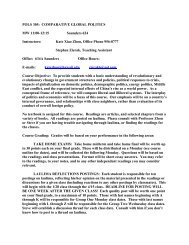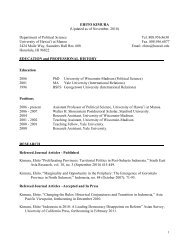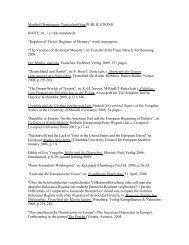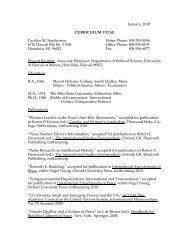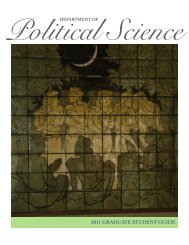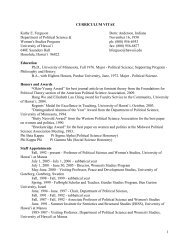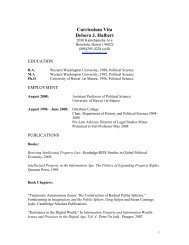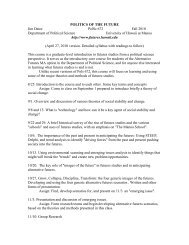syllabus - Department of Political Science
syllabus - Department of Political Science
syllabus - Department of Political Science
You also want an ePaper? Increase the reach of your titles
YUMPU automatically turns print PDFs into web optimized ePapers that Google loves.
Summer 2013 <br />
POLS 305: Global Politics/Comparative <br />
Course Period: June 4 th to August 11 th , 2013 <br />
Katie Brennan <br />
Email: kpjb@hawaii.edu <br />
Office: N/A <br />
Online Office Hours (available Gmail Chat): Tuesdays 1pm to 2pm, Thursdays 5pm to <br />
6pm, and by appointment <br />
Course Overview: <br />
This course will <strong>of</strong>fer an introduction to Comparative Politics, which is a subfield <strong>of</strong> <br />
<strong>Political</strong> <strong>Science</strong>. Comparative Politics is a field <strong>of</strong> study that examines various political <br />
issues in states and societies around the world. We will look at some <strong>of</strong> the theoretical <br />
components <strong>of</strong> Comparative Politics using a number <strong>of</strong> case studies, and we will also study <br />
the broader global context. We will examine various regime types, using case studies to <br />
further illuminate the variety. <br />
In looking at Comparative Politics we will examine issues like regimes, ideology, societies, <br />
political economy (both domestic and international), and globalization. You will encounter <br />
these concepts through both traditional political science texts like journal articles and book <br />
chapters, but we will also examine them through popular culture texts like short stories, TV <br />
shows, and movies. <br />
Course Objectives: This course is designed as a survey <strong>of</strong> the field <strong>of</strong> Comparative Politics. <br />
The key course objectives are: <br />
1. Mastery <strong>of</strong> key concepts in Comparative Politics <br />
2. Ability to apply these concepts to real world examples <br />
3. An improved knowledge <strong>of</strong> countries from around the world <br />
4. Ability to form and present arguments <strong>of</strong> your own in a variety <strong>of</strong> formats, including <br />
popular online formats. <br />
Information you need to know: <br />
Office Hours. As this is an online course I will not be holding in-‐person <strong>of</strong>fice hours, but I <br />
will still be making myself available regularly. I will be online and signed into Gmail Chat <br />
using my Hawaii email address on Tuesdays from 1pm to 2pm and Thursdays from 5pm to <br />
6pm. If those hours do not work for you or you are not comfortable using Gmail Chat, <br />
please email me directly (kpjb@hawaii.edu). I would be happy to answer yours questions <br />
by email, Gmail Chat, and Skype. <br />
Plagiarism. Plagiarism is a very straightforward and simple concept: if you present <br />
someone else’s words or ideas as your own then you are plagiarizing them. Plagiarism is a <br />
form <strong>of</strong> theft and academic dishonesty. Some examples include doing any <strong>of</strong> the following <br />
<br />
1
without proper citation: cutting and pasting text from a website, paraphrasing another <br />
person’s ideas, directly copying words from any source (book, journal, script), etc. Doing <br />
any <strong>of</strong> the above is cheating and will result in serious consequences. Any work that is <br />
deemed to include plagiarized material will be failed. <br />
I understand that generally people resort to plagiarism when they are under pressure for <br />
various reasons: work, family, relationships, or simply not understanding the material. <br />
Please talk to me if you are having trouble with the work. We will work something out <br />
together that will be much better than cheating and failing. <br />
If you have any questions about the plagiarism policy <strong>of</strong> the school please see the UHM <br />
Student Conduct Code: www.hawaii.edu/ail/students/plagiarism.html. For all UHM <br />
policies on academic integrity please see this page: <br />
http://www.manoa.hawaii.edu/students/conduct/impermissible_behavior.html. <br />
Services to students with disabilities. If you have any kind <strong>of</strong> disability and you are <br />
concerned about access to the course or completing the required work, I encourage you to <br />
contact KOKUA. The KOKUA program is located on the ground floor <strong>of</strong> the Student Services <br />
Center, online (http://www.hawaii.edu/kokua/), and can also be reached by phone at 956-‐<br />
7511. <br />
Computer Labs. Computer labs are available in both the Sinclair and Hamilton libraries <br />
for all students. The College <strong>of</strong> Social <strong>Science</strong>s has additional computer labs in Saunders <br />
and Crawford Halls. You can find the exact locations and hours on their websites: <br />
www.hawaii.edu/itslab/index.htm <br />
www.socialsciences.hawaii.edu/pages/tech/lab/labschedules.html <br />
Writing Center. If you are concerned with the level <strong>of</strong> your writing or you are looking for <br />
additional assistance the English <strong>Department</strong> has a writing center. It is really important to <br />
plan in advance if you want to use the writing center because their available appointments <br />
can fill up quickly. For more information you can check out their website: <br />
www.english.hawaii.edu/writingcenter/ <br />
Required Reading: <br />
All required readings will be available on Laulima, and are listed by class meeting. <br />
Assignments: <br />
All assignments should be typed, double-‐spaced, 12 point font, with proper grammar, <br />
spelling, and sentence structure. For assignments turned in electronically please make <br />
sure that your files are word documents (the file ending should be .doc or .docx). <br />
1. You are required to do the assigned reading every week. When reading <br />
material for class you should be reading actively, which means underlining or <br />
highlighting passages that seem important, writing notes in the margin, marking <br />
passages that you have questions about, and so on. Reading assigned texts before <br />
watching podcast lectures will make the lectures much more useful for you. <br />
<br />
2
2. Everyone is expected to keep up with the readings and the podcast lectures. I <br />
have already posted all <strong>of</strong> the readings for the semester in the Resources folder on <br />
Laulima. I made a separate subfolder for each week to make it easier for you to <br />
locate the appropriate readings. I will post podcast lectures for each week by <br />
Sunday at 5pm (HPS). Throughout the semester there will also be optional TV <br />
episodes and movies that you can watch to enrich the lecture podcasts. <br />
3. You will take a short quiz each week on Laulima by Friday at 5pm. These <br />
quizzes will focus on material from the lecture podcasts and your readings. (These <br />
quizzes comprise 15% <strong>of</strong> your final grade) <br />
4. You will be working on a single project throughout the semester. This project <br />
encompasses both your final report and a wiki that you will develop throughout the <br />
semester. Each <strong>of</strong> you will choose a different country to research. You cannot <br />
choose a country that we are using as a case study (UK, China, Germany, Iran, <br />
Mexico) or the US. You will choose your country in the first week <strong>of</strong> class by June <br />
6 th . <br />
a. You will be developing a wiki throughout the semester using the Wiki <br />
tool on Laulima. Each week you must post on and link to an article that <br />
covers a current event or issue in the country <strong>of</strong> your choosing. You must do <br />
these weekly postings from week 2 through week 9, and they should be <br />
posted by Thursday at 5pm each week. These weekly postings should be at <br />
least 250 words, and should focus on your analysis <strong>of</strong> the current event. You <br />
will also need to work on gathering background information on your country, <br />
describing its current regime and where it came from, etc. The point <strong>of</strong> the <br />
wiki is to help you develop a broad knowledge <strong>of</strong> your chosen country <br />
throughout the semester, which will prepare you to write your final report. <br />
(The wiki is worth 20% <strong>of</strong> your final grade). <br />
b. Your final report is due by Midnight on August 9 th . You need to turn the <br />
paper in electronically via the drop box on Laulima. The report should be 10 <br />
to 15 pages in length. I will give you more information about the structure <br />
and what material to include later in the semester. (The final report makes <br />
up 35% <strong>of</strong> your grade) <br />
5. You are required to complete a blog post each week by 5pm on Thursday. The <br />
point <strong>of</strong> these blog posts is for you to engage with the readings beyond the <br />
classroom. Each week I will post 2 to 3 questions by Sunday at 5pm, and you will <br />
then choose 1 question to answer. Your answers should be 1 to 2 paragraphs in <br />
length, and must include at least 1 quote from the primary texts we covered that <br />
week. You can also bring in external material (current events, popular culture texts, <br />
etc.) if it helps you answer the question. Your first blog post is due on June 13 th by <br />
5pm, and your last regular blog post is due on August 1 st by 5pm. You will also be <br />
required to post a reflective blog post during the last week <strong>of</strong> class. (Your blog <br />
grade is worth 20% <strong>of</strong> your grade) <br />
6. You will also be required to comment on your peers’ work throughout the <br />
semester. You must comment on at least one person’s blog post and at least one <br />
person’s wiki each week. You will begin commenting on each other’s posts and <br />
wikis in Week 3. Your comments should be in response to posts and wiki additions <br />
from the previous week. For example, your first comments on blog posts and wikis <br />
<br />
3
are due during Week 3, and these comments should cover posts completed by June <br />
13 th (Week 2). You will have to comment from Week 3 through Week 10. (Your <br />
comments on blog posts and wikis are worth 10% <strong>of</strong> your final grade). <br />
Summary <strong>of</strong> assignments and grading: <br />
Wikis <br />
Final <br />
Quizzes <br />
Blog <br />
Comments <br />
Report <br />
15% 20% 20% 10% 35% <br />
Weekly, due <br />
Fridays by 5pm <br />
Weekly, due <br />
Thursdays by 5pm <br />
Weekly, due <br />
Thursdays by 5pm <br />
Weekly, due <br />
Thursdays by 5pm <br />
8/9 <br />
Bonus Opportunity: <br />
You have the option to complete an additional blog post (at least 250 words) explaining <br />
how a popular culture piece <strong>of</strong> your choosing (TV show, movie, short story, etc.) made you <br />
think differently about Comparative Politics. You can neither post on something that <br />
someone else has already posted about, nor something that you read or watched for an <br />
assignment in this class. The deadline will be the last day <strong>of</strong> class (8/9). <br />
<br />
4
Tentative Class Schedule** (Subject to alteration with notice) <br />
Week Number Topics Readings Assignments <br />
1 (6/4-‐6/7) <br />
Introduction, <br />
Regime Types <br />
and Ideologies <br />
Weber, O'Neil ch. 1, <br />
Ball p. 3-‐10, MJS Ch. <br />
12 Pick countries, set up wikis <br />
Schmitter, MJS Ch. 7, Begin blogs, wikis, and <br />
2 (6/10-‐6/14) Democracy <br />
3 (6/17-‐6/21) Case Study: UK <br />
4 (6/24-‐6/28) Marxism <br />
5 (7/1-‐7/5) <br />
Case Study: <br />
China <br />
6 (7/8-‐7/12) Authoritarianism <br />
Case Study: <br />
Germany (WWII) <br />
7 (7/15-‐7/19) and Iran <br />
International <br />
<strong>Political</strong> <br />
8 (7/22-‐7/26) Economy (IPE) <br />
9 (7/29-‐8/2) <br />
Case Study: <br />
Mexico <br />
VB ch. 10, Weldes <br />
O'Neil ch. 2, <br />
Newspaper articles <br />
Communist <br />
Manifesto, Choose <br />
any 3 excerpts from <br />
Ball ch. 5 and ch. 6 <br />
O'Neil ch. 7, Harvey <br />
ch. 5, Chiang (story) <br />
Diamond, Zoline <br />
(story), Ball Ch. 7 <br />
MJS p. 437-‐451, <br />
Rupert and Solomon <br />
TBA <br />
10 (8/5-‐8/9) Course Wrap-‐Up None <br />
O'Neil ch. 10, <br />
Newspaper articles <br />
quizzes <br />
Begin commenting on each <br />
other's blogs and wikis <br />
Because the Thursday is July <br />
4th, I will extend the normal <br />
Thursday deadlines to Friday <br />
at 5pm for this week only <br />
Final regular blog post, <br />
comments on blogs and <br />
wikis, and quiz <br />
Final Paper Due, complete <br />
your wiki, and a reflective <br />
blog post <br />
**I have structured the course to pair key theoretical concepts and categories with <br />
country-based case studies. We will examine common aspects in each case study <br />
(political institutions, important historical events, and so on). Following each key <br />
topic with a case study is useful for undergraduate students as it demonstrates how <br />
the concepts work in the real world. In particular the case studies show how messy <br />
the concepts become when applied, which makes the course more obviously useful <br />
to the students. <br />
<br />
5
Full Citations for Class Readings {Please see the end <strong>of</strong> the page for notes} <br />
Ball, Terrence and Richard Dagger. Ideals and Ideologies, A Reader. 5 th Edition. New York: <br />
Pearson Longman, 2004. Print <br />
Chiang, Ted. “Exhalation.” The Wesleyan Anthology <strong>of</strong> <strong>Science</strong> Fiction. Eds. Arthur B. Evans, <br />
et al. Middletown: Wesleyan University Press, 2010. 742-‐756. Print <br />
Diamond, Larry, “Thinking About Hybrid Regimes.” Journal <strong>of</strong> Democracy 13.2 (April 2002): <br />
21-‐35. Web <br />
Greenberg, Martin Harry and Joseph D. Olander. “Introduction.” International Relations <br />
Through <strong>Science</strong> Fiction. Eds. Martin Harry Greenberg and Joseph D. Olander. New <br />
York: New Viewpoints, 1978. xi-‐xviii. Print <br />
Harvey, David. A Brief History <strong>of</strong> Neoliberalism. New York: Oxford University Press, 2005. <br />
Print <br />
O’Neil, Patrick, and Karl Fields, and Don Share. 2006. Cases in Comparative Politics. New <br />
York, London: W.W. Norton Press. Print <br />
Rupert, Mark and M. Scott Solomon. “A Brief History <strong>of</strong> Globalization.” Globalization and <br />
International <strong>Political</strong> Economy: The Politics <strong>of</strong> Alternative Futures. New York: <br />
Rowman and Littelfield Publishers, 2005. 25-‐53. Print <br />
Schmitter, Philippe and Terry Lynn Karl. “What Democracy Is…and Is Not.” Journal <strong>of</strong> <br />
Democracy 2.3 (Summer 1991): 77-‐88. Web <br />
Sodaro, Michael J. Comparative Politics, A Global Introduction. 2 nd Edition. Boston: McGraw <br />
Hill, 2004. Print. {MJS} <br />
Van Belle, Douglas A. and Kenneth M. Mash. A Novel Approach to Politics: Introducing <br />
<strong>Political</strong> <strong>Science</strong> through Books, Movies, and Popular Culture. 2 nd Edition. <br />
Washington, D.C.: CQ Press, 2010. Print {VB} <br />
Weber, Max. Politics as a Vocation. <br />
. Web <br />
Weldes, Jutta. “Popular Culture, <strong>Science</strong> Fiction, and World Politics: Exploring Intertextual <br />
Relations.” To Seek Out New Worlds: Exploring Links between <strong>Science</strong> Fiction and <br />
World Politics. Ed. Jutta Weldes. New York: Palgrave Macmillan, 2003. 1-‐30. Print <br />
<br />
6
Zoline, Pamela. “The Heat Death <strong>of</strong> the Universe.” The Wesleyan Anthology <strong>of</strong> <strong>Science</strong> <br />
Fiction. Eds. Arthur B. Evans, et al. Middletown: Wesleyan University Press, 2010. <br />
415-‐429. Print <br />
Notes <br />
1. MJS on the <strong>syllabus</strong> refers to the Michael J. Sodaro text <br />
2. Most <strong>of</strong> the readings from the “Ball” text are excerpts from other things, and so the <br />
citations are a bit more involved than the generic one that I have listed here. For example, <br />
if you want to cite “Utopia” by Thomas More, which can be found in Ball chapter 5 (class <br />
meetings Week 4), then your citation should look something like this: <br />
More, Thomas. “Utopia.” Ideals and Ideologies, A Reader. 5 th Edition. Eds. Terrence <br />
Ball and Richard Dagger. New York: Pearson Longman, 2004. 197-203. Print. <br />
So you have to add the author and title <strong>of</strong> the excerpt, as well as the page numbers that you <br />
can see in the PDF version on Laulima. <br />
3. I’ve used the MLA format here, but you can use other citation systems as long as they are <br />
consistent. For information on citation systems (including everything you need to know to <br />
use them properly) you can visit the OWL Purdue website: <br />
http://owl.english.purdue.edu/owl/section/2/ <br />
4. I will add citation information for new readings that I add to the <strong>syllabus</strong>. I will let you <br />
know if I add or take away readings. <br />
<br />
7



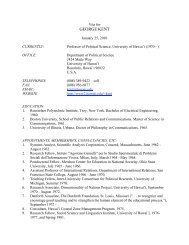
![Fall 2012 POLS 620 Syllabus [PDF] - Department of Political Science](https://img.yumpu.com/25416938/1/190x245/fall-2012-pols-620-syllabus-pdf-department-of-political-science.jpg?quality=85)
